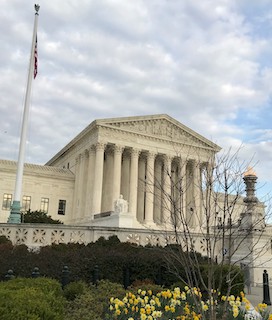In 2019, the U.S. Supreme Court decided Rehaif v. United States (2019) 139 S. Ct. 2191, wherein the highest court held that a defendant may be convicted under 18 U.S.C. § 922(g) only if the government proves that defendant “knew he belonged to the relevant category of persons barred from possessing a firearm.” This charge, felon in possession of a firearm, is a quite common charge in federal court (often the only charge a defendant may face), so such a ruling was looked upon with great interest.
In a Nutshell: To be convicted of being a felon in possession of a firearm, the prosecution must prove that defendant knew he was not allowed to own, possess or purchase a firearm or ammunition, which is why judges very deliberately and one the record warn anyone convicted of a felony of this prohibition as a convicted felon.
In the United Stated District Court in San Francisco, Lamar Johnson was charged with various drug and firearm offenses, including two counts of being a felon in possession of a firearm. During the course of the case, Johnson moved to suppress evidence of the firearms and other evidence found during searches of his home and car. The district court denied the motion.
To facilitate appellate review of that ruling, Johnson waived his right to a jury trial and agreed to proceed with a stipulated facts bench trial. In lieu of calling witnesses, the parties submitted a stipulated statement of facts, which included, as relevant here, that two different firearms were found in Johnson’s possession on separate dates and that, prior to the dates in question, he “had been convicted of a felony, i.e., a crime punishable by imprisonment for a term exceeding one year.”
Based on the stipulated facts, the district court found Johnson guilty of violating 18 U.S.C. § 922(g)(1).
Johnson did not argue in the district court that the evidence was insufficient to sustain his convictions, which is understandable because at the time of Johnson’s trial, Ninth Circuit law did not require the government to prove that a defendant knew of his status as a convicted felon. See United States v. Miller (9th Cir., 1997) 105 F.3d 552, 555.
 U.S. Supreme Court
U.S. Supreme Court
However, after Johnson’s trial, the Rehaif ruling was issued and Johnson petitioned for certiorari and argued for the first time that the government failed to prove at trial that he knew of his status as a convicted felon despite the court record containing stipulated facts about Johnson’s prior felony convictions.
The court record separately also contained information about Johnson serving many years in prison for a variety of felony convictions. For example, he was sentenced to state prison and served 28 months for a felony conviction in 1998. In 2004, he was convicted of another felony and was sentenced to two years in state prison. And in 2007, he was convicted of a third felony and was sentence to two years in state prison again.
The Ninth Circuit Court of Appeals, in reviewing Johnson’s writ of certiorari, first recited the applicable law governing Johnson’s dubious argument. To establish plain error under Federal Rule of Criminal Procedure 52(b), Johnson had to demonstrate: 1) there was an error; 2) the error was clear and obvious; 3) the error affected his substantial rights; and 4) the error seriously affected the fairness, integrity or public reputation of judicial proceedings. United States v. Benamore (9th Cir., 2019) 937 F.3d 1182, 1188.
The United States Attorney General’s office conceded that 1) there was an error and 2) that the error was clear and obvious. The Ninth Circuit then found that the district court erred by not requiring the government to prove Johnson’s knowledge of his status as a convicted felon and that the error is now clear following Rehaif.
The Ninth Circuit further pointed out that it would further assume without deciding whether the district court’s error affected Johnson’s substantial rights, thereby satisfying the third prong.
As to the fourth prong, whether the error “error seriously affected the fairness, integrity or public reputation of judicial proceedings,” the Ninth Circuit set forth a history of the plain error cases. In doing so, the Ninth Circuit held that in this case, “Johnson cannot show that refusing to correct the district court’s error would result in a miscarriage of justice.”
According to the presentence report prepared in this case, at the time he possessed the firearms, Johnson had sustained three prior felony convictions for which he was sentenced to state prison. Therefore, the Ninth Circuit held “Johnson cannot plausibly argue that a jury (or judge if he opted again for a bench trial) would find that he was unaware of his status as someone previously convicted of an offense punishable by more than a year in prison. After all, he had in fact already served three prior prison sentences exceeding one year.”
This was not a case like in Rehaif, where defendant had been convicted of a felony, but placed on probation.
We bring this summary to the reader’s attention because of this new change in the 18 U.S.C. § 922(g) law for being a felon in possession of a firearm, as it is a common charge in federal court and if someone was only sentenced to probation for a felony, such a claim of lack of knowledge may be viable.
The citation for the U.S. Ninth Circuit Court of Appeals ruling discussed above is United States of America v. Lamar Johnson (9th Cir., 2019) 913 F. 3d 793.
For more information about illegal possession of firearm issues, please click on the following articles:
 U.S. Supreme Court
U.S. Supreme Court